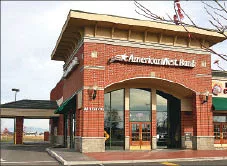
Home » AmericanWest scraps acquirer role
AmericanWest scraps acquirer role
Amid losses, bank seeks to shed costs, raise capital

November 20, 2008
AmericanWest Bancorp says it expects to reduce its overall work force by up to 10 percent and to secure private equity funding, regardless of any federal bailout money it might receive, as part of a broad effort to stem losses and get back on stronger financial footing.
The Spokane-based institution says it hopes to secure the capital it needs by around the end of the year and to reap roughly $6 million in annual savings by streamlining its operation, which will include closing six of its 64 branches on Jan. 30.
"I am entirely confident we can get through this," says Patrick J. Rusnak, who recently was appointed CEO and president of the holding company and its main operating subsidiary, AmericanWest Bank. "We certainly have our challenges. It's not easy sledding, but it's fixable, and we can emerge a better company. I think we have a significant amount of the loan losses behind us."
AmericanWest continues, though, to explore a range of options that include possibly selling some branches or being acquired by or merging with another bank, although the likelihood of the latter seems small, given the current weakened state of the banking industry nationally.
Rusnak says the 34-year-old institution, which just three years ago was seeking to become the Inland Northwest's largest community bank and—as his predecessor worded it—the region's "acquirer of choice," has dumped that aggressive expansion strategy and revamped its structure in the wake of the sharp real estate market downturn.
It has reduced its administrative team to five people from eight, and has jettisoned its former "silo"-type structure, which included separately administered retail, commercial, and private banking divisions, in favor of a single management chain of command focused on community banking, he says. The old system, he says, was more appropriate for a bank with a much larger asset base.
"What we had developed was something we hoped could be a $10 billion bank at some time. Ultimately, the economy was not going to allow that to be achieved," Rusnak says. What the bank is using now, he says, is "a simpler, more traditional type of approach that is more commensurate with the size of the company. It's a top-down shift."
Its new structure, below him, includes a general counsel attorney, two chief banking officers—one overseeing the Washington and Idaho markets, and the other overseeing Utah operations—and a yet-to-be-recruited chief financial officer.
Additionally, to save about $200,000 a year, the bank has reduced the amount of space it leases in its headquarters building, at 41 W. Riverside, vacating and subleasing to Wachovia Securities the 8,000-square-foot fifth floor. It still occupies the entire fourth floor, and has a private banking suite on the third floor and a branch that occupies most of the first floor, but has moved some administrative functions formerly housed there to its east Spokane support center at 110 S. Ferrall.
The bank currently employs a little over 700 people, equating to about 650 full-time positions. The anticipated reduction of up to 10 percent of that work force as part of an effort to cut costs thus could mean the loss of 65 to 70 jobs.
Rusnak says the branches the bank plans to close occupy a mix of leased spaces and buildings the bank owns, and that it will seek to sell the latter properties.
He says AmericanWest submitted on Nov. 7 its application for the about $57 million in federal bailout money it believes it's eligible to receive under the Emergency Economic Stabilization Act, but doesn't know when it will hear a response nor whether it will receive the full amount it's seeking. In exchange for the funds, banks issue senior preferred stock to the government and are required to pay a 5 percent annual dividend on the stock initially.
"We're cautiously optimistic that we have a viable business model that will be looked at favorably," Rusnak says, but adds, "We have plans to restore our capital here regardless of the outcome." It's possible, he says, that a private equity investor might co-invest in the bank with the U.S. Department of Treasury.
AmericanWest reported assets of just under $2 billion as of Sept. 30, down from about $2.1 billion a year earlier. Unlike Robert M. Daugherty, the bank's former president and CEO, who was the driving force behind AmericanWest's push to expand through acquisitions, Rusnak says his focus will be on service delivery, profitability, managing risk, ensuring a positive customer experience, "and not having hanging over our heads the need to grow."
AmericanWest recently posted a third-quarter loss of $96.9 million, or $5.63 a diluted share, compared with net income of $5.3 million, or 31 cents a share, in the year-earlier period, and announced plans to close branches on the West Plains, in the Qualchan area, and in Latah, Oakesdale, and Kennewick, Wash., plus an in-store branch in St. Maries, Idaho.
The company said its latest quarterly results included an $82 million non-cash goodwill impairment charge based on an analysis of its holdings by an independent valuation firm in light of market conditions.
For the first nine months of 2008, the company reported a loss of $134.7 million, or $7.62 a share, compared with net income of $12.1 million, or 79 cents a share, in the year-earlier period.
Stock plunges
AmericanWest's struggles have contributed heavily to a more than 90 percent drop in its stock value over the last year, as its share price has fallen from more than $19 in October 2007 to around $1.60 earlier this week, rebounding slightly from a low of $1. The company contends, nevertheless, that it's in healthier shape than some media accounts portray.
"I think we have taken a more aggressive approach to identifying and resolving problem loans" than many other financial institutions and have been quicker to declare goodwill impairments, or write-offs, stemming from those loans, Rusnak says. Such charges reflect the difference between the stock value and book value of certain assets, he says, but he adds that goodwill is considered by regulators to have no value and isn't factored into banks' important capital adequacy ratios.
He adds that as of the end of the third quarter, the bank exceeded the capital threshold for "well-capitalized" in two of three regulatory capital ratios, which are designed to ensure banks can absorb a reasonable level of losses before becoming insolvent.
In the other ratio, which measures a bank's total capital to its risk-weighted assets, or credit exposure, he says, AmericanWest was just $13.8 million short of the $191 million—or 10 percent of its risk-weighted assets—needed to be considered well-capitalized. Still, it was well above the 8 percent threshold for being considered adequately capitalized.
In its latest quarterly report, the bank also noted that it had processed about $339 million in new loans through the first nine months of this year, though that was down about one-third from last year, and had seen double-digit increases in service-charge and mortgage-banking revenues over the prior period.
Even minus the big goodwill impairment charges, though, the bank lost $14.9 million in the latest quarter and $25.7 million over the first three quarters of this year. Meanwhile, its total nonperforming assets were 4.46 percent of total assets as of Sept. 30, more than double the 1.9 percent of a year earlier, and it recorded a provision for loan losses of $27.7 million for the latest quarter, up from a $1.2 million loan-loss provision in the year-earlier period. The latest loan-loss provision figure equated to 6.23 percent of average loans on an annualized basis, up from 0.29 percent a year ago.
Rusnak says the bulk of the bank's recent problems stem from its exposure to residential construction and development loans, mostly in Utah, where the real estate market crashed after an extended hot stretch, along with one sizable loan in Boise. AmericanWest inherited some of the problem loans from Far West Bancorporation, of Provo, Utah, which it acquired in April 2007, but many also were loans it had made in Utah prior to that acquisition.
"I would characterize it as a derivative impact of sub-prime," because the collapse of that formerly surging portion of the mortgage industry had a detrimental effect on other parts of the residential real estate market as well, Rusnak says.
He says he doesn't think the bank acted imprudently when it decided to get involved in the then-hot Utah market, under Daugherty's leadership, as part of its expansion push. Far West had been a very profitable, well-run bank in a market with strong demographics, he says, and Daugherty knew that market well, having worked there for a number of years.
"I think you could characterize it as bad timing," Rusnak says. "I still think, for us, it was done with good long-term strategic intentions. In the longer term, I think good markets can trump good management. I thought it was well thought out strategically."
The problem, he says, was that, "Nobody saw the downturn coming as swiftly as it did."
"It's a little painful right now," as that market continues to struggle, he says. He adds, though, that, "It's a market that's going to come back."
Rusnak joined AmericanWest in 2006, becoming the bank's chief operating officer and then its combined COO and chief financial officer.
Rusnak says he's putting in long days to return AmericanWest to profitability, and adds, "I wouldn't be working as hard as I'm working if I didn't think it's fixable. We're doing everything we can do, and we have some good people helping us."
Latest News
Related Articles




